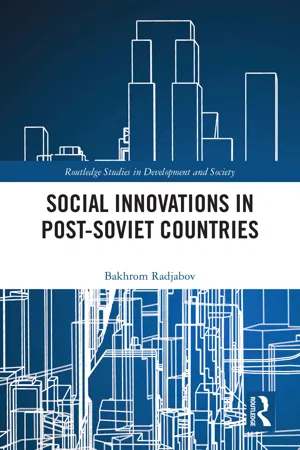
- 208 pages
- English
- ePUB (mobile friendly)
- Available on iOS & Android
Social Innovations in Post-Soviet Countries
About this book
This book evaluates the evolution of social innovation in post-Soviet Central Asia, Eastern Europe and Caucasus.
Following the dissolution of the USSR, organisations such as the UNDP have encouraged local communities and governments to innovate in order to find solutions to existing social problems. This book demonstrates that progress with social innovations has varied, with countries with low government support such as Uzbekistan struggling, whereas countries with better government support and a more active civil society, such as Armenia and Ukraine, have seen more positive results. Covering the period 2012-2020 and a broad range of countries, including Kazakhstan, Kyrgyzstan, Tajikistan and Uzbekistan, Moldova, Ukraine, Azerbaijan, Armenia, and Georgia, this book provides an impressively broad-ranging critical analysis of post-Soviet social innovation.
Including social innovations emerging as a result of the Covid-19 outbreak, this will be an important comparative study for researchers and practitioners working on social innovation, and to those with an interest in post-Soviet development.
Tools to learn more effectively

Saving Books

Keyword Search

Annotating Text

Listen to it instead
Information
1 Background
| Country/organization | When ‘social innovation’ projects were launched (year) |
|---|---|
| Kazakhstan | |
| AstanaHuba and UNICEF | 2019 |
| Partnership for Innovations (P4I)/Civil Society Development Association (ARGO)b | 2015 |
| USAID Civil Society Support Program in Central Asia (later USAID Social Innovation in Central Asia)c | 2019 |
| Eurasian Foundation of Central Asiad | 2016 |
| Kyrgyzstan | |
| Social Innovation Lab Kyrgyzstan (SILK)e | 2021 |
| Tajikistan | |
| Internewsf | 2017 |
| Country/organization | When ‘social innovation’ projects were launched (year) |
| Uzbekistan | |
| UNDP/UNV “Social innovations and volunteerism” Projectg | 2012 |
| “Yuksalish” Nationwide movement, Partnership For Innovations (P4I) projecth | 2019 |
| Azerbaijan | |
| Social Innovation Lab (SIL)i | 2016 |
| The State Agency for Public Service and Social Innovations under the President of the Republic of Azerbaijan (ASAN)j | 2012 |
| Accelerator Labsk | 2019 |
| Georgia | |
| Service Lab Public Service Development Agencyl | 2014 |
| Armenia | |
| Kolba Labm | 2013 |
| Eurasia Partnership Foundationn | 2014 |
| Ukraine | |
| Close to You Foundation (ADV)o | 2019 |
| SocialBoostp | 2012 |
| TAPASq | 2016 |
| Eidosr | 2012 |
| Moldova | |
| UNDP MILabs | 2014 |
| Close to You Foundation (ADV)t | 2020 |
1.1 Selection of case studies
| Countries | International Donor/ICSO | Government | Local CSO, academic institution |
|---|---|---|---|
| Kazakhstan | UNICEF and Astana Hub USAID | EF ARGO | |
| Kyrgyzstan | OSF | American University of Central Asia | |
| Tajikistan | Internews | ARGO | |
| Uzbekistan | UNDP/UNV | “Yuksalish” Nationwide movement | |
| Azerbaijan | UNDP | ASAN | |
| Georgia | UNDP through ServiceLab under MoJ | ||
| Armenia | UNDP, EU, EF | ||
| Ukraine | UNDP, EU, EF, ADV | Youth Public Organization “New European Generation” | |
| Moldova | UNDP, EU, ADV | Academy of Public Administration | Ecoul Cernobilului Foundation; Association of Cross-border Cooperation “Lower Danube Euroregion” /Romania; Ecoul Cernobilului Foundation; Cross-Border Cooperation and European Integration Agency. |
1.1.1 Central Asia
1.1.2 Caucasus
Table of contents
- Cover
- Half Title Page
- Series Page
- Title Page
- Copyright Page
- Table of Contents
- List of tables
- Introduction
- 1 Background
- 2 Generation, features and assessment of the ‘social innovation’ projects supported by different organizations in post-Soviet Central Asia
- 3 Generation, features and assessment of the ‘social innovation’ projects supported by different organizations in post-Soviet Caucasus
- 4 Generation, features and assessment of ‘social innovation’ projects supported by different organizations in post-Soviet Eastern Europe
- 5 COVID-19 and ‘social innovation’ projects in post-Soviet countries
- 6 Analysis and conclusion on ‘social innovation’ projects in post-Soviet countries: findings and perspectives
- Index
Frequently asked questions
- Essential is ideal for learners and professionals who enjoy exploring a wide range of subjects. Access the Essential Library with 800,000+ trusted titles and best-sellers across business, personal growth, and the humanities. Includes unlimited reading time and Standard Read Aloud voice.
- Complete: Perfect for advanced learners and researchers needing full, unrestricted access. Unlock 1.4M+ books across hundreds of subjects, including academic and specialized titles. The Complete Plan also includes advanced features like Premium Read Aloud and Research Assistant.
Please note we cannot support devices running on iOS 13 and Android 7 or earlier. Learn more about using the app